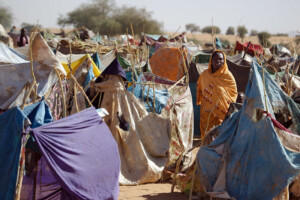Interview: No to Women’s Oppression Initiative
Radio Dabanga spoke with Ihsan Fagiri of the No to Women’s Oppression Initiative on the occasion of the UN 16 Days of Activism against Gender-Based Violence in Sudan, which started last Wednesday. As public gatherings were banned according to the country’s new COVID-19 measures, the activities that were planned as part of the UN initiative had to be cancelled.
 Ihsan Fagiri, head of the No to Women Oppression Initiative working as a tea vendor (Social media)
Ihsan Fagiri, head of the No to Women Oppression Initiative working as a tea vendor (Social media)
Radio Dabanga spoke with Ihsan Fagiri of the No to Women’s Oppression Initiative on the occasion of the UN 16 Days of Activism against Gender-Based Violence in Sudan, which started last Wednesday. As public gatherings were banned according to the country’s COVID-19 measures, the activities that were planned as part of the UN initiative had to be cancelled.
Ihsan Fagiri, medical doctor and founder of the No to Women’s Oppression Initiative, told Radio Dabanga in an interview on Wednesday that the organisation, and other women groups including the Sudan Women Union, had cancelled their planned activities early.
“We were expecting a second COVID-19 wave,” she said.
The initiative originally prepared a forum to discuss the weak participation of women in Sudanese politics. They argue that excluding, or not including, women in politics is a form of violence and oppression.
The women activists also planned to organise a protest vigil in front of the Council of Ministers in Khartoum and deliver a memorandum to the Minister of Justice concerning the matter of political exclusion.
The coordinator of the Women’s Groups for Peace and Security, lawyer Azza Hasan, discussed the matter earlier this year. In an interview with Radio Dabanga, she said that “The revolution came to change concepts, but so far there has been no change in Sudan,” and explained that “women and other vulnerable and marginalised groups in the various states of Sudan have not yet obtained their rights as required.”
The 16 Days of Activism against Gender-Based Violence is an annual international campaign that kicks off on 25 November, the International Day for the Elimination of Violence against Women, and runs until 10 December, Human Rights Day.
Last year, the No Oppression Against Women Initiative organised a rally in Omdurman to celebrate the 16-day campaign against violence against women and the International Day for Human Rights, and to commemorate the December revolution.
Due to the second wave of COVID-19 infections and stricter health measures, the planned activities for this year’s edition have now been postponed to a later date.
No to Women’s Oppression Initiative and the Public Order Law
The No to Women’s Oppression Initiative was formed in 2009 by women intellectuals, lawyers, and scholars to defend women's rights in Sudan after Lubna El Hussein, a Sudanese journalist working for the UN, was detained alongside 13 other women for wearing trousers in a restaurant in Khartoum.
At the time, authorities considered wearing ‘indecent dress’, such as trousers, to be a violation of Public Order Law. In November last year, the law was abolished by the new government of Prime Minister Abdallah Hamdok.
Before the trial began on August 4, 2009, ten women had already been flogged for wearing trousers.
At the trial, Lubna Hussein bought her own whip for the judge to deliver her punishment of 40 lashes. In an interview with Radio Dabanga, she said: “I went today to the court wearing exactly the same trousers at the day when I was caught by the public order police, so everybody will be able to see whether this is decent dress or not. I want to give hope to all women, especially the women in Darfur who suffer so much”.
She also said: “I am not fearing physical pain as a consequence of my conviction and the battle for women’s rights in Sudan”.
One of the activists who demonstrated against the trial in front of the court in Khartoum carried a banner saying No to Oppression Against Women.
Fagiri, Amal Habani, Tahani Abbas, Rasheeda Shamseldin, Najlaa Norein, and Gumuriya Omar took this slogan as the name of their initiative against the Public Order Law. They explain that this law “affected all segments of women, including women workers, sellers of tea and food, employees, doctors, etc.”
In 2017, Fagiri explained that more than 45,000 complaints were issued against women under Sudan's Public Order Act during 2016. “Students, working women, and especially food and tea vendors have received the lion's share of physical and verbal violence.”
More than 15,000 women have reportedly been sentenced to flogging, and women rights activists were subjected to unfair arrests and excessive physical and verbal violence.
The No to Women's Oppression Initiative has launched many campaigns against the Public Order Law to raise awareness among women and inform them about their constitutional, legal, and societal rights.
They also staged vigils and handed over various memoranda to judicial authorities.
Fagiri explains that “Many times, we [women protestors] faced harsh repression during our campaigns.”
In 2014, for example, security services detained 16 activists of the No to Women‘s Oppression Initiative after they staged a protest in front of a prison to demand the release of several women politicians.
At the time, eyewitnesses reported that the security forces used large quantities of tear gas to disperse the protesting women and that some of the women were beaten.
Rabah El Sadig was one of them and told Radio Dabanga: “We were detained and released again without being told what the charges were.”

Awards
Later in 2014, the initiative received a Human Rights Award from the Delegation of the European Union to Sudan.
To promote human rights in Sudan, the Delegation of the European Union celebrates the International Day for Human Rights each year with a reception, a concert, and an award ceremony.
In 2019, the Society for Threatened Peoples honoured Ihsan Fagiri with the Weimar Human Rights Prize in recognition of her efforts to improve and serve women's issues and human rights.
Relationships
The Initiative has extensive relationships with similar organisations in Africa, the Arab World, Europe, and other western countries,
Fagiri also explains: “Within Sudan, we have good relations with the Sudanese Women's Union and many other civil society organisations that have the same goals as the Initiative in Sudan.”
For its finances, the No to Women's Oppression Initiative depends on membership subscriptions, grants, and donations. Fagiri explained that they “also had a lot of support from the Siha Network”, the Strategic Initiative for Women in the Horn of Africa.
Siha addresses “women’s subordination and violence against women and girls in the Horn of Africa”.
Fagiri works as an associate professor at the Faculty of Medicine of the University of Bahri. She is a member of the executive office of the Sudanese Doctors Union and an active member of the Sudanese Women's Union.
Radio Dabanga thanks Awadiya Yousef for doing the interview in Khartoum
Radio Dabanga’s editorial independence means that we can continue to provide factual updates about political developments to Sudanese and international actors, educate people about how to avoid outbreaks of infectious diseases, and provide a window to the world for those in all corners of Sudan. Support Radio Dabanga for as little as €2.50, the equivalent of a cup of coffee.












 and then
and then